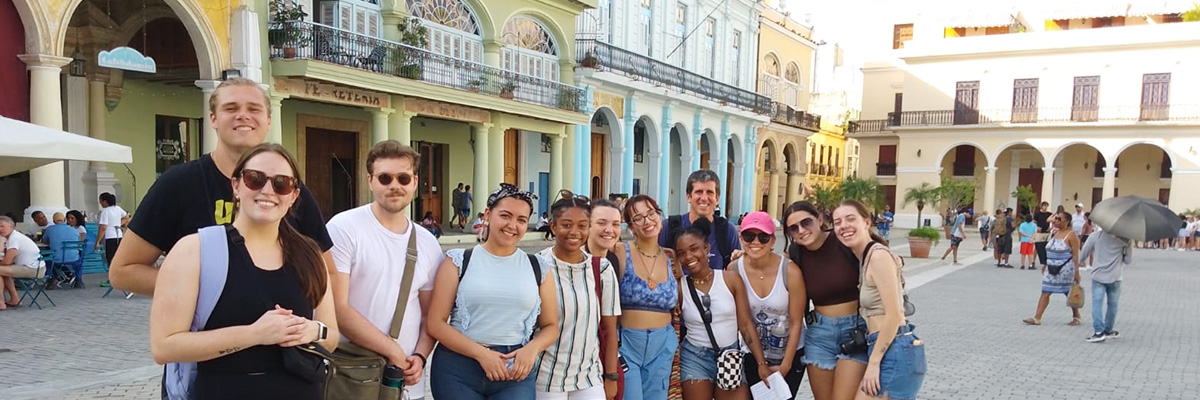La Habana Courses – 2025 January Session
Courses
You will enroll in three or four credits. At least one 3-credit course is required. Courses are intensive and typically meet three hours each day plus nightly homework assignments. Course availability is contingent on student enrollment and is subject to change.
Click the course title to view course details and description.
Cuban History, Society, Politics, and Latin American Culture Studies
The following courses focus on the culture and history of Cuba.
- January SessionSociology Women's Studies / Gender Studies 300-level 1 credit Taught in English
Women's activism gained strong visibility in the past few years. This movement was enhanced by the power of new technologies and the Internet. This course provides an introduction to gender theory and women movements. Additionally, students will explore the more recent strategies utilized by feminists and women's movements to rally support and fight against gender violence of all kinds. Students will examine how feminists have used the Internet and social networks as a powerful tool to rally support. The interaction with some of the local main characters of this new ways of activism will provide the students with the opportunity to discuss these topics first hand, addressing as well the new forms of 'Internet violence' that emerge as a reaction.
- January Session200-level 1 credit Taught in English and Spanish
An introduction to a local cuisine in a hands-on kitchen environment. Authentic preparations of several local dishes will be taught. Correct cooking techniques are emphasized. Readings and lectures on local food customs and traditions will support and contextualize the cooking instruction.
The cuisine functions as an activity that is generated in daily practice and transmitted orally from generation to generation. History is part of civilization and tells about the culture of people. The cuisine is traditional, magic, art, experience, human tenacity and refined technique.
According to some, has to do with the family inheritance, the transmission of knowledge and a sum of traditions. No one is closer to an artist as we would say that a good cook, but there is some talent to which all human beings are not touched with the same grace.
The kitchen, like music, literature and other arts, is part of the cultural treasure of every nation to be missed.
This course has an additional fee
- January SessionDance 100-level 1 credit Taught in Spanish
The objectives of this course are to understand the antecedents of Latin American dance and to learn to perform correctly folkloric dances from Costa Rica as well as the spicier Caribbean salsa rhythms.
Taught in Spanish but appropriate for everyone
- January SessionPolitical Science 400-level 3 credits Taught in English
This course is designed to introduce the student to the core political issues facing the Our American region, which means to include the Caribbean experiences. The major problems facing this region: authoritarianism, dictatorships, revolutions, social conflicts as increase of violence, political corruption, the presence of the US policy and economic dependence from the American capital, political and economic development, “democratic transition” and the supposed consolidation of democratic practices, as well as the indigenous and other minority group rights, will be introduced in turn.
- January Session400-level 3 credits Taught in English
Students will explore the socio-political systems and historical context of Cuba and the Caribbean. This course will present contemporary theoretical perspectives that express the complex socio-economic, cultural, and political reality of the area. Students will cover the recurring topics of culture and "race"; daily life; and religion within Cuba and the Caribbean. This course will analyze ways in which these themes are common to other Latin American colonial societies. Students will draw upon the works and anthropological thinking of Fernando Ortiz; Jean Price-Mars; and C.L.R. James. The goal of this course is to provide a general anthropological overview of Cuba and the Caribbean.
- January SessionSpanish 300-level 1 credit Taught in Spanish
A course that complements the development of linguistic skills emphasizing the oral mode of the Spanish language. It aims to improve students' ability to maintain a sustained monologue as well as oral interactions.
Prerequisite: two semesters of college-level Spanish, or equivalent
To request a course syllabus: syllabus@usac.edu

